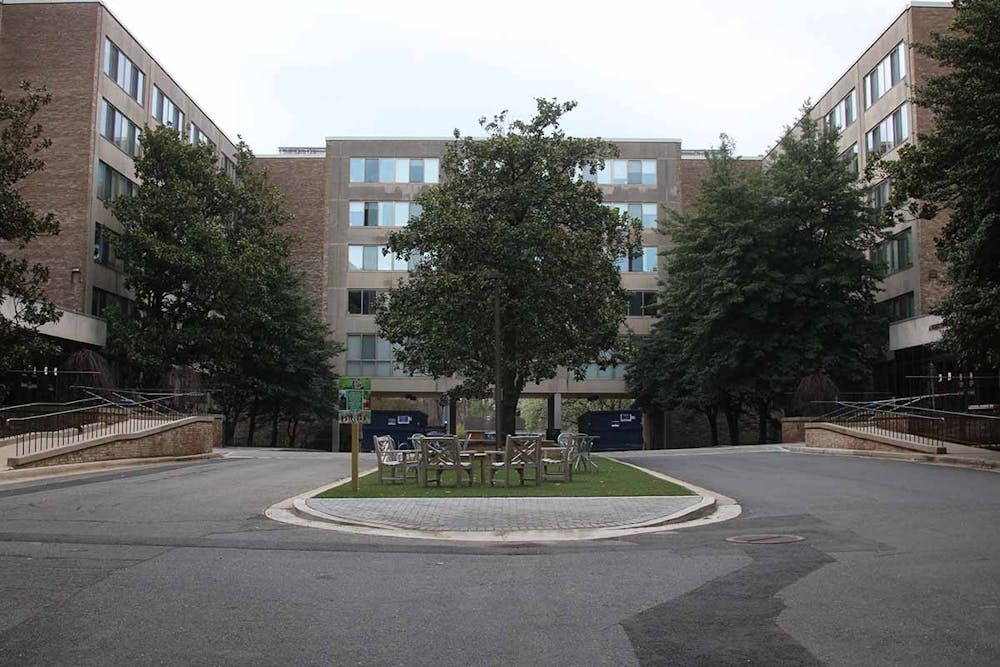Editor’s note: this article originally appeared on theeaglecoronavirusproject.com, a separate website created by Eagle staff at the onset of the coronavirus pandemic in spring 2020. Articles from that website have been migrated to The Eagle’s main site and backdated with the dates they were originally published in order to allow readers to access them more easily.
This article has been updated with a correction. Abigail Goldner Morris did not directly reach out to housing.
Students living on campus felt stranded after the University sent out an email announcing that all students had to vacate their dorms in less than two weeks’ time.
Tom Lebert, a senior in the School of Public Affairs, said when he received the email that said students should return to their permanent residences, he panicked. He said he needed to stay in D.C. not only because he has a job that he cannot afford to lose, but also because he is a low-income student and would not be able to move his belongings.
For some students living and working in D.C., returning home was not an option. Students said their on-campus housing accomodations allowed them to have access to their jobs and a safe place to live, with others saying they wouldn’t be able to afford rent in D.C. right now.
In the email sent on March 12, President Sylvia Burwell said the University knew some students would not be able to leave campus due to “extraordinary circumstances.” She said students could apply for emergency housing through the Office of Campus Life.
“I sent the email to them within 10 minutes or less,” Lebert said. “I gave them a very brief description of my situation.”
While Lebert cited his job and status of income, there were other factors weighed heavily when reviewing requests. Assistant Vice President of Student Engagement Carllos Lassiter said they also considered students who lived in close proximity to epicenters of the virus and who did not have a safe permanent residence to return to.
“While we recognize that everyone who applied for emergency housing has valid concerns, for those students who were denied housing, based on the information they provided, there are other ways to address those needs,” Lassiter said in an email.
Ultimately, Lebert received emergency housing, but canceled it after he found somewhere off-campus to live. In the response he received, the University suggested that he sought “alternative living arrangements” as the CDC and the D.C. Department of Health determine the University’s capabilities on a continuous basis.
Emma Tucker, a senior in the School of Education, said she was denied emergency housing despite having a student-teaching job that she needs to complete to obtain her teaching certificate.
Although D.C. public schools are now shut down until at least April, she said she is unsure of what she would do if they opened back up and she would have liked to return if they do.
“Since then, I’ve talked to my advisors and they are creating an alternative system so that way, if I am not able to make it back or able to crash with a friend, I’ll still graduate, which is a huge relief,” Tucker said.
Lassiter said they typically weighed jobs less heavily in requests due to the fact that many companies would have their employees telework and many retail stores and restaurants were closing or minimizing their services.
“Our focus needs to be on the safety and health of AU students,” Lassiter said.
Sigma Alpha Epsilon President Leo Harris decided he wanted his fraternity to do their part in helping members of the AU community who were displaced or denied emergency housing. In a post to the AU Class of 2022 Facebook group, he said the fraternity’s house was open to anyone who needed it.
“You’re going to have students coming from all over the country, whether that’s international students as well as people from California, from various parts that are definitely going to be displaced,” Harris said. “I think it was about trying to have a place where people can feel like they were at home.”
Harris said while no one reached out to the fraternity about staying at the house, they also wanted students to be able to use it as a place where they could store their belongings. He said their offer still remains open.
Abigail Goldner Morris, a sophomore in the College of Arts and Sciences, started a similar initiative — she formed a list of people who were offering their spaces to D.C. students who were in need of housing while they figured out their plans or did not have a safe home. She said it is still ongoing and about 10 students used it by submitting a request via Google Forms.
Morris said she created the list because she thought it was unfair to disadvantaged students who were being forced to move off campus so quickly, including LGBTQ+ students who may not have a good support system at home.
“We realized dorm closures would be especially difficult for low income students who might not be able to afford multiple tickets and moving costs, as well as for some queer students who may not have a safe home,” Morris said.
When the students that helped Morris create the form reached out to housing for more answers on the criteria they were looking at to determine who would get housing, she said they never received a response.
The University said that students who received emergency housing would have to move out of their current dorms to another building by March 26. As of publication, they are providing housing until May 6.





